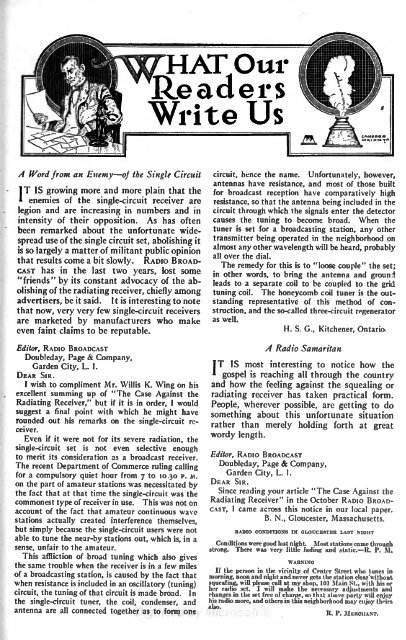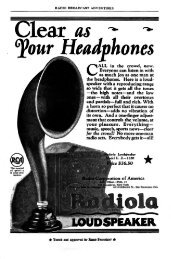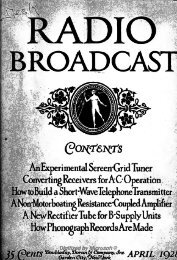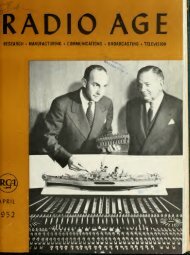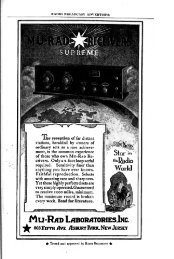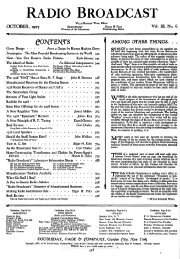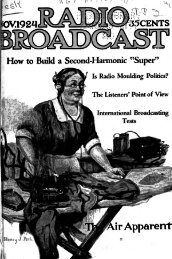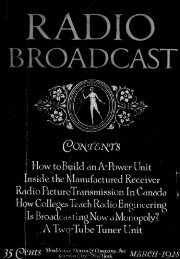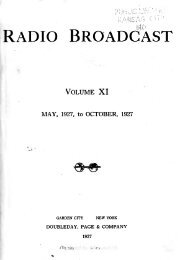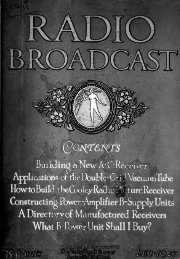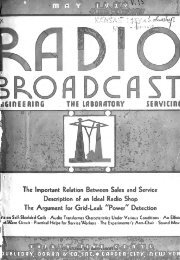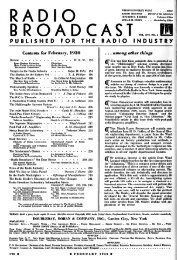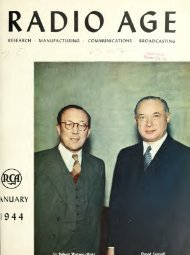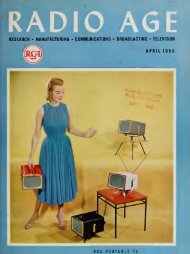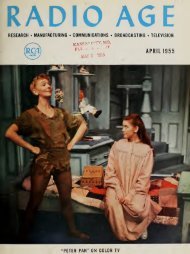Radio Broadcast - 1925, February - 113 Pages ... - VacuumTubeEra
Radio Broadcast - 1925, February - 113 Pages ... - VacuumTubeEra
Radio Broadcast - 1925, February - 113 Pages ... - VacuumTubeEra
You also want an ePaper? Increase the reach of your titles
YUMPU automatically turns print PDFs into web optimized ePapers that Google loves.
Our<br />
HAT<br />
,<br />
Readers<br />
Write Us<br />
A Word from an Enemy<br />
of the Single Circuit<br />
IT IS growing more and more plain that the<br />
enemies of the single-circuit receiver are<br />
legion and are increasing in numbers and in<br />
intensity of their opposition. As has often<br />
been remarked about the unfortunate widespread<br />
use of the single circuit set, abolishing it<br />
is so largely a matter of militant public opinion<br />
that results come a bit slowly. RADIO BROAD-<br />
CAST has in the last two years, lost some<br />
"friends" by its constant advocacy of the abolishing<br />
of the radiating receiver, chiefly among<br />
advertisers, be it said. It is interesting to note<br />
that now, very very few single-circuit receivers<br />
are marketed by manufacturers who make<br />
even faint claims to be reputable.<br />
Editor, RADIO BROADCAST<br />
Doubleday, Page & Company,<br />
Garden City, L. I.<br />
DEAR SIR.<br />
I wish to compliment Mr. Willis K. Wing on his<br />
excellent summing up of "The Case Against the<br />
Radiating Receiver," but if it is in order, I would<br />
suggest a final point with which he might have<br />
rounded out his remarks on the single-circuit receiver.<br />
Even if it were not for its severe radiation, the<br />
single-circuit set is not even selective enough<br />
to merit its consideration as a broadcast receiver.<br />
The recent Department of Commerce ruling calling<br />
for a compulsory quiet hour from 7 to 10.30 p. M.<br />
on the part of amateur stations was necessitated by<br />
the fact that at that time the single-circuit was the<br />
commonest type of receiver in use. This was not on<br />
account of the fact that amateur continuous wave<br />
stations actually created interference themselves,<br />
but simply because the single-circuit users were not<br />
able to tune the near-by stations out, which is, in a<br />
sense, unfair to the amateur.<br />
This affliction of broad tuning which also gives<br />
the same trouble when the receiver is in a few miles<br />
of a broadcasting station, is caused by the fact that<br />
when resistance is included in an oscillatory (tuning)<br />
circuit, the tuning of that circuit is made broad. In<br />
the single-circuit tuner, the coil, condenser, and<br />
antenna are all connected together as to form one<br />
circuit, hence the name. Unfortunately, however,<br />
antennas have resistance, and most of those built<br />
for broadcast reception have comparatively high<br />
resistance, so that the antenna being included in the<br />
circuit through which the signals enter the detector<br />
causes the tuning to become broad. When the<br />
tuner is set for a broadcasting station, any other<br />
transmitter being operated in the neighborhood on<br />
almost any other wavelength will be heard, probably<br />
all over the dial.<br />
The remedy for this is to "loose couple" the set;<br />
in other words, to bring the antenna and ground<br />
leads to a separate coil to be coupled to the grid<br />
tuning coil. The honeycomb coil tuner is the outstanding<br />
representative of this method of construction,<br />
and the so-called three-circuit regenerator<br />
as well.<br />
H. S. G., Kitchener, Ontario.<br />
A <strong>Radio</strong> Samaritan<br />
TT IS most interesting to notice how the<br />
1<br />
gospel is reaching all through the country<br />
and how the feeling against the squealing or<br />
radiating receiver has taken practical form.<br />
People, wherever possible, are getting to do<br />
something about this unfortunate situation<br />
rather than merely holding forth at great<br />
wordy length.<br />
Editor, RADIO BROADCAST<br />
Doubleday, Page & Company,<br />
Garden City, L. I.<br />
DEAR SIR.<br />
Since reading your article "The Case Against the<br />
Radiating Receiver" in the October RADIO BROAD-<br />
CAST, I came across this notice in our local paper.<br />
B. N., Gloucester, Massachusetts.<br />
RADIO CONDITIONS IN G1OUCESTEB LAST NIGHT<br />
Conditions were good last night. Most stations came through<br />
strong. There was very little fading and static. R. P. M.<br />
WARNING<br />
If the person in the vicinity of Center Street who tunes in<br />
morning, noon and night and never gets the station clear'without<br />
squealing, will please call at my shop, 101 Main St., with his or<br />
her radio set. I will make the necessary adjustments and<br />
changes in the set free of charge, so that above party will enjoy<br />
his radio more, and others in this neighborhood may enjoy theirs<br />
also.<br />
R. P. MERCHANT.


